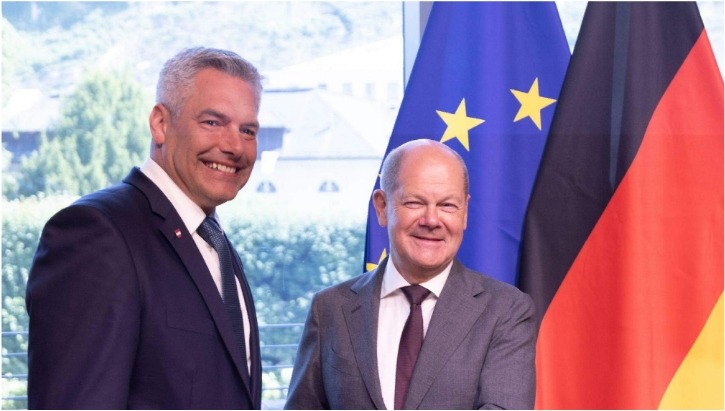
A diplomatic push for cooperation and mutual understanding was in full swing as German Chancellor Olaf Scholz touched down in Salzburg today. The visit, marked by symbolism and discussions on crucial matters, aimed to strengthen the bonds between Germany and Austria.
Arriving in a Luftwaffe plane, Chancellor Scholz wasted no time in engaging with Austrian Chancellor Karl Nehammer. Their tête-à-tête at the New Mozarteum set the stage for a day of substantial talks. A joint press conference and convivial lunch followed, underscoring the optimism and camaraderie displayed during the early hours of the visit.
However, the visit was not without its constraints, as Scholz’s busy schedule forced a swift departure for Munich later in the day, causing him to miss the renowned Salzburg Festival. Despite this, the momentum of their discussions remained.
At the heart of the visit was a clear effort to highlight the depth of the neighborly relationship shared between the two countries. The meeting held particular significance, as Scholz’s presence marked the first bilateral visit by a German head of government to Austria in over ten years, signifying a renewed commitment to dialogue and collaboration.
The discussions were anchored around five key subjects of paramount importance: the ongoing Ukraine conflict, energy security, the expansion of the Schengen zone, the future trajectory of the European Union, and the pressing matter of migration.
Scholz’s commitment to supporting Ukraine emerged resoundingly during the talks. Germany pledged unwavering support as long as it’s required, and Chancellor Nehammer welcomed Austria’s involvement in the Sky Shield initiative, a collective European effort for enhanced protection. Both leaders concurred on the need to ensure the security of energy supplies, with Austria highlighting its gas storage capabilities and its synergy with Germany in this domain. A shared vision materialized in the form of a collaborative effort to establish a southern corridor for green hydrogen transportation from Africa to Europe by 2030, aiming to break free from the reliance on Russian fossil fuels.
Migration policies emerged as a rallying point for the German Social Democrats and the Austrian Christian Democrats, as both leaders presented a united front. Chancellor Scholz lauded the recent EU asylum compromise, highlighting substantial progress. Meanwhile, Chancellor Nehammer underscored the vitality of safeguarding the EU’s external borders and streamlining asylum procedures. Scholz adroitly navigated the issue of Schengen zone expansion, favoring the inclusion of Romania and Bulgaria while tactfully avoiding deeper exploration of the subject.
Criticism was reserved for Hungary, as both leaders gently reprimanded the country for allowing migrants to proceed without proper registration. An alignment of views was found on the early accession of Western Balkan countries to the EU, contingent upon EU decision-making mechanisms receiving a much-needed overhaul.
Notwithstanding their differences over the unanimity principle, the harmonious atmosphere that permeated the Salzburg meeting remained intact. The visit underscored shared goals of bolstering energy security, advancing EU expansion, and managing migration, all while acknowledging the existence of differing perspectives. Ultimately, the encounter served as a testament to the spirit of cooperation that binds the two nations, signaling a promising chapter in their bilateral relations.
